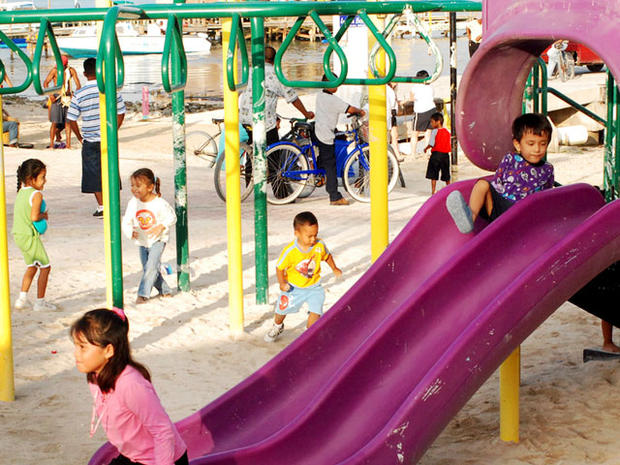Boring playgrounds tied to sedentary kids, study shows
(CBS) Without risk there's nothing to lose, right? When it comes to kids' playgrounds these days, that means there's no weight to lose, either.
PICTURES - Oops! 8 ways parents make kids fat
A new study suggests a new cause behind childhood obesity and children leading sedentary lifestyles: Boring playgrounds.
The study - published in the February 2012 issue of Pediatrics - found that because of stricter licensing codes, playgrounds are now less physically challenging - and more boring - to children. Not only are kids less interested in the playgrounds, some parents also ask daycare staff to restrict their child's physical activity for fear of injury.
Are the days of kids playing on slides, climbing on monkey bars, and hanging off merry-go-rounds over?
For the study, researchers held focus groups with 49 daycare teachers from 34 child-care centers in Cincinnati to pick their brains on the current state of play and physical activity at preschool.
"Physical activity is essential for kids in this age group for preventing obesity and for development," study author Dr. Kristen Copeland, an assistant professor of pediatrics at Cincinnati Children's Hospital Medical Center, told Reuters. "But the teachers were saying they were pressured by parents and somewhat by state early learning standards to emphasize classroom learning."
The study authors say childcare may be one of the only opportunities for outdoor play for some children who lack a safe place to play near their home. So playing it safe by making preschool students learn instead of going outside, may also mean playing it sorry.
"The emphasis on pre-academics, concerns about safety, and limitation in budgets and space have created the perfect storm for young children to get less than the desired amount of physical education and exercise," Dr. Andrew Adesman, chief of developmental and behavioral pediatrics at the Steven and Alexandra Cohen Children's Medical Center of New York in New Hyde Park, told WebMD. "Certain learning takes place through unstructured physical activity, such as coordination, sharing, and possibly creativity."
More than one third of children and adolescents are overweight or obese, according to the Centers for Disease Control and Prevention - and this includes preschoolers. Obese children are likely to raise their risk for heart disease, high cholesterol, high blood pressure, diabetes, and bone and joint problems.
Playground equipment can be dangerous - nearly 220,000 kids aged 14 and under were sent to the emergency room for playground-equipment injuries in 2009, according to a Safe Kids Worldwide.
Angela Mickalide, director of research and programs at Safe Kids, told Healthday she wasn't ready to make playgrounds less safe to get kids moving more.
Said Mickalide, "A kid with a traumatic brain injury or fracture is going to be even less active."

